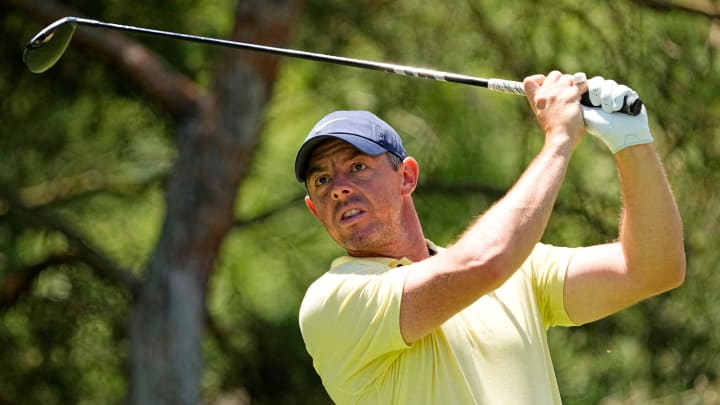Rory McIlroy’s 10-Year Major Drought Remains a Puzzle, and the Answer Is in His Head

Rory McIlroy is one of the finest golfers in history, but also the worst kind: A deep thinker. He doesn’t just consider the lie, the distance and the wind; he thinks about who he is, what he wants, and how it might feel to get it. This is part of his appeal. It is also why he has not won a major in 10 years.
McIlroy’s last major championship win was the 2014 PGA. Since then, he has won 17 PGA Tour events and gone 0-for-36 in majors.
How stark is the difference between Majors Rory and Non-Majors Rory? Well, when McIlroy plays a non-major Tour event, he wins 12 percent of the time. I used a probability calculator to answer the question: If an outcome has a 12 percent chance of happening, what is the likelihood of it not happening 36 straight times?
The answer: 1 percent.
History bears that out. Since players started playing all four majors regularly, only two players have had a stretch of 17 PGA Tour wins without a major. One was Arnold Palmer at the end of his career. The other was Phil Mickelson at the beginning of his career. McIlroy’s drought has occurred in the prime of his career.
Majors come down to three factors: Quality of play; mental state; and circumstances.
McIlroy’s quality of play has been championship-worthy; part of what makes the drought so mystifying is that he frequently finishes in the top 10.
Circumstances include weather, course setup and luck. We like to believe that luck evens out over 72 holes, and certainly over the course of a career, but it doesn’t, really. With better luck, Greg Norman and Dustin Johnson would have 10 majors between them instead of four. But luck has not been a significant factor for McIlroy. There is no Larry Mize chip-in or playoff lip-out during his drought.
This leaves us with the delicate exercise of analyzing McIlroy’s brain during majors.
There is an issue there, but it is a subtle one. If major-championship pressure was too much for him, he would not have won four of them, and he would not be in contention so often. The issue is not as simple as hitting great shots in big moments. McIlroy closes out a lot of events. His 2-iron on the windy 72nd hole of the 2023 Scottish Open was as good as golf gets. He holds his own in the Ryder Cup.
McIlroy plays his best when he is in a flow state: Thinking about playing well and nothing else. He has won a lot of PGA Tour events by running away from the field. Two of his four major victories were 8-stroke romps. When McIlroy just thinks about making birdie on every hole, there is nobody better.
When he thinks about what it would mean to win a major, he has problems. We saw this first during his Sunday meltdown at the 2011 Masters. We have seen it at Augusta National plenty of times since. McIlroy needs a green jacket to complete a career Grand Slam, and he wants it so desperately that he seems to psych himself out.
In 2019, the British Open returned to McIlroy’s home country of Northern Ireland for the first time in 68 years. He opened with a quadruple bogey. In the final round of the 2022 British Open, McIlroy hit all 18 greens in regulation—and two-putted 18 times. He parred the last eight holes, his longest streak without a birdie all week. At last year’s U.S. Open, McIlroy birdied 15 of his first 55 holes—and none of his last 17.
McIlroy’s comments and body language provide a window into his mind. He celebrated a hole-out on the 72nd hole of the 2022 Masters as though he had forced a playoff, when he actually finished second and had no real chance to win. He later said his final-round 64 gave him a positive memory at Augusta National, and acknowledged the round meant more to him than it did on the leaderboard.
In 2019, McIlroy said he expected Brooks Koepka to win the PGA Tour Player of the Year award because Koepka had won a major (the PGA) and he had not. But when players voted for McIlroy, he said this:
“I think this speaks volumes about what PGA Tour players feel is important. I've harped on this a little bit over the course of the year: I think players don't just feel four weeks a year are important, it's more than that. We play for a lot more.
“Why do we play 25 times a year when only four weeks are really important? I think it's a huge vote of confidence from the players that we play for more than just what maybe the narrative suggests.”
The other weeks do matter. But these four weeks matter more—to fans, for history, and to McIlroy. Sometimes he seems to try to mind-trick himself into believing majors are like every other tournament. That works for some players, but McIlroy’s mind is not built for those kinds of tricks.
We don’t know when McIlroy will win another major, but we can take a pretty good guess at how. He will stop worrying about how it will feel to win. He’ll just think about how much fun it is to kick ass—and he’ll remember that nobody in golf does that better than he does.
